I took my weimaraner Remy to our first bird dog training day with NAVHDA this spring (North American Versatile Hunting Dog Association).
I was very nervous because I was out of my element. I’ve never gone hunting in my life, and I have never trained a dog for hunting or for field trials.
So today I’m writing about our experience and what to expect at your first NAVHDA training day if you ever attend one. I hope this helps someone!
IN THIS POST:
- What is NAVHDA?
- The versatile hunting dog breeds
- What to expect at your first NAVHDA training day
- Here’s what to bring to training
- Searching for birds
- Tracking and water retrieves
- It’s OK if you have no experience
- Is it too late to train my hunting dog?
- Benefits of NAVHDA
What is NAVHDA?
NAVHDA is a non-profit organization that educates people about training “versatile” hunting dogs in North America. The organization has dozens of chapters across the United States and Canada that host sanctioned training days, hunt tests, seminars, youth events and other activities.
In my experience, the organization has been very welcoming of beginners like me and most of the people there doing the training are also fairly new. Everyone is there to learn and improve.
The versatile hunting dog breeds
NAVHDA defines a versatile hunting dog as a breed bred to reliably:
- hunt and point game
- retrieve on both land and water
- track wounded game on both land and water
It currently recognizes 30 breeds. You guessed it, the weimaraner (my dog) is one of these breeds, along with the vizsla, the Brittany spaniel, German shorthair pointer and all of the setter breeds.
The retrieving breeds such as Labs and goldens are not considered versatile hunting dogs, according to NAVHDA’s philosophy.
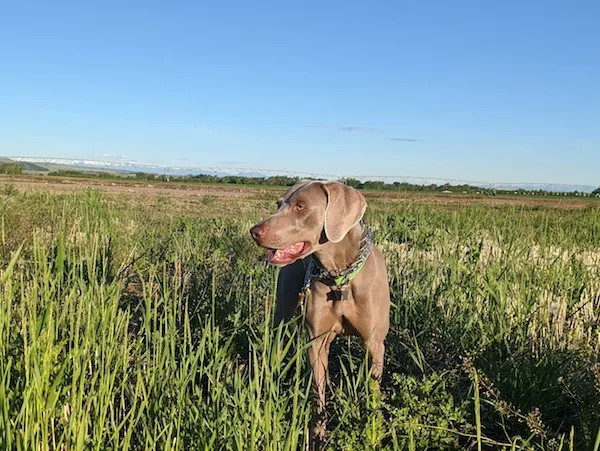
What to Expect at Your First NAVHDA Training Day
Every chapter is a little different, so email the person in charge and ask questions.
I’ll briefly go over what our NAVHDA training days look like here in Montana.
One of my observations is that the communication is not perfect. I had to email three or four different people before I finally got a reply about how to join and where to go. So keep trying. Also join your local chapter’s Facebook group, if they have one.
In our case, the training time and location was listed on the local chapter’s website, along with a general idea of what to bring. Our training days typically start around 8 a.m. to beat the heat and wrap up around 1 p.m. With our local chapters, you can attend one event without being a member, but after that you’re expected to join (about $45 per year).
What to bring to your first NAVHDA training day
- A lot of water for yourself and your dog (two 1-gallon jugs minimum)
- A long rope or check cord (30 ft is good) – no handle on the end
- Gloves to prevent rope burn!
- Cash or check to pay for the 4-5 birds you might use (around $5-8 per pigeon)
- Blaze orange hat or vest for yourself
- Leash and training collar – I use a prong collar
- Crate or tieout post (or crate from your car if it’s cool)
- Dog treats, if you want
- Snack or lunch for yourself
- Ear plugs or other hearing protection
- Good shoes/boots – you move around a lot!
- Waders if you have them (if there will be water retrieving)
- E-collar for recall if your dog is already trained on one (otherwise don’t worry about it)
- Training dummy/bumper if there will be water retrieves
- Fold up lawn chair (optional)
You probably won’t need these things at your first NAVHDA training day:
- Shotgun and ammo
- Blaze orange for your dog
- Bird launcher
- Birds (will be provided)
How NAVHDA training days work
I’ve attended four training days total here in Montana. I get the sense that other chapters around the country are fairly similar.
In our case, one or two people were in charge, but several of the other experienced members were helping out. They set up a training station or two and we all rotated through, each of us practicing roughly the same thing with each dog.
We had roughly 10 dogs and handlers each day. Most were puppies or young dogs – beginners just like us. Almost everyone there was training for one of NAVHDA’s tests – either Natural Ability for the young dogs or the Utility Test for a few advanced dogs.
We were the only ones not preparing for an actual test.
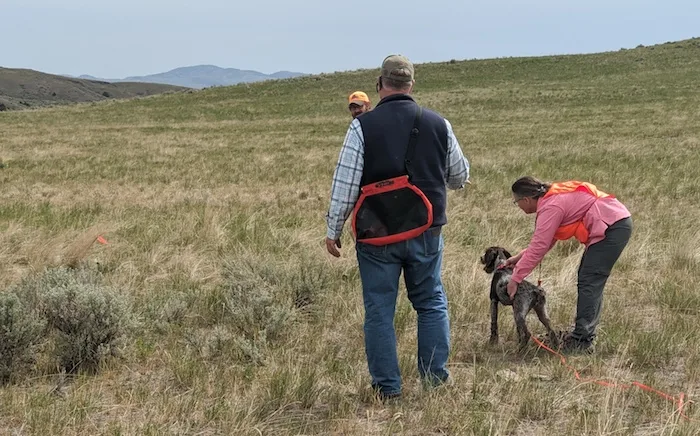
The handlers were a mix of men and women and a variety of ages. I say this because some younger women might feel intimidated (as I did), but you should not feel this way. Everyone is helpful and there to learn.
What we worked on at the first NAVHDA training day
We worked on having the dogs search for planted live birds (pigeons) out in the field placed in bird launchers. A bird launcher safely holds the bird until it is released by a remote. Sometimes we shoot the released bird and sometimes we just want the dog to chase the bird as it flies away.
Searching for planted birds
I had Remy on a 30-ft check cord while he searched for birds so I could prevent him from charging the bird once he found it. (We want the dogs to stop and “point,” not charge.)
Ideally, Remy would pause and point for a few seconds. Then one of the trainers would “launch” the bird for him to chase. I let go of the check cord so Remy could then run. This was to build his existing bird drive.
We did not do any actual shooting or retrieving birds with Remy until his third and fourth training days. The goal at first was simply to get him interested in birds and to help him understand he was supposed to be looking for them.
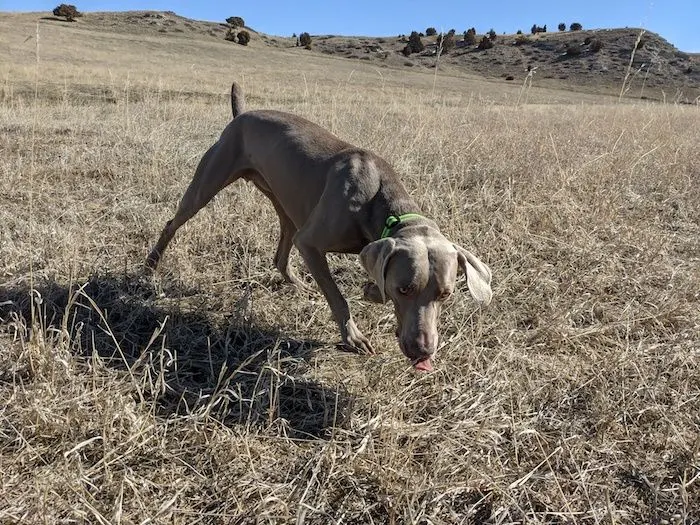
Tracking and water retrieves
At your NAVHDA training day, you will most likely work on searching, “steadiness” and retrieving on land, like we did.
The dog’s steadiness means he will hold on point while the handler flushes and shoots the bird. Then the dog is sent to retrieve the bird. Ideally, anyway.
You might also work on tracking or water retrieves. Tracking is where someone will drag a dead duck or pheasant several yards while your dog is out of sight. Then you bring your dog to the start of the track where a few feathers have been dropped. You release your dog and ideally he should use his nose to find the bird.
The water retrieves are what you’d expect. You’ll work on introducing your dog to water, building confidence and excitement and hopefully retrieving bumpers or birds.
Remy and I have worked on water retrieves on our own, outside of NAVHDA.
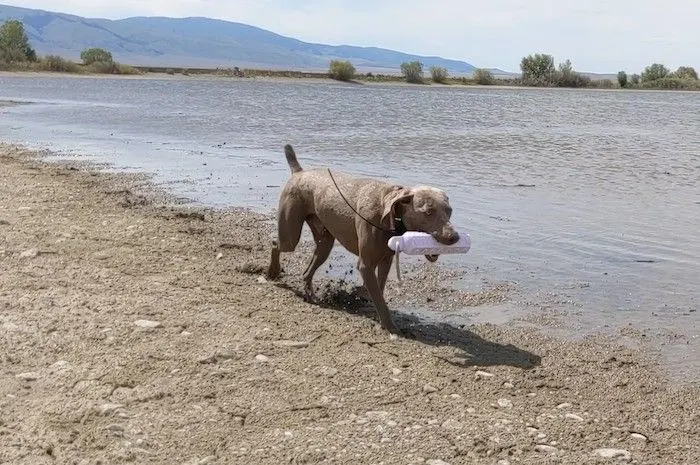
Take the training advice for what it’s worth – pick and choose
You have to keep in mind that these are not necessarily professional dog trainers. They are certainly experienced dog trainers and hunters and a few are breeders. But most do not make a living training dogs.
You will see a variety of training styles and opinions at a NAVHDA training day, and this is OK.
For example, some members use e-collars (shock collars) as I do. Some don’t. Certain trainers like to keep dogs on check cords. Others want to let their dog just be a dog and figure things out.
Some trainers will use chain or prong collar as I do. You likely won’t see many harnesses or treats.
You’ll see a lot of “tough” guys on their knees praising their puppies with pats and giggles.
Everyone is very proud.
All I mean is, you have to be an advocate for your own dog.
Speak up if you want to try something a little different than what the “leader” is suggesting or if you prefer to skip a certain training drill. This is totally OK.
At the same time, it’s not the end of the world if you try a slightly different training approach than what you’re used to. For the most part, these breeds are pretty resilient and go with the flow.
It’s OK if you have no experience with hunting or training
My dog and I are an interesting pair. A bit amusing to some of the other members, I’m sure.
Honestly, some of them probably wonder why the heck we’re even attending. I think some members are surprised we’ve returned for a second, third and fourth time.
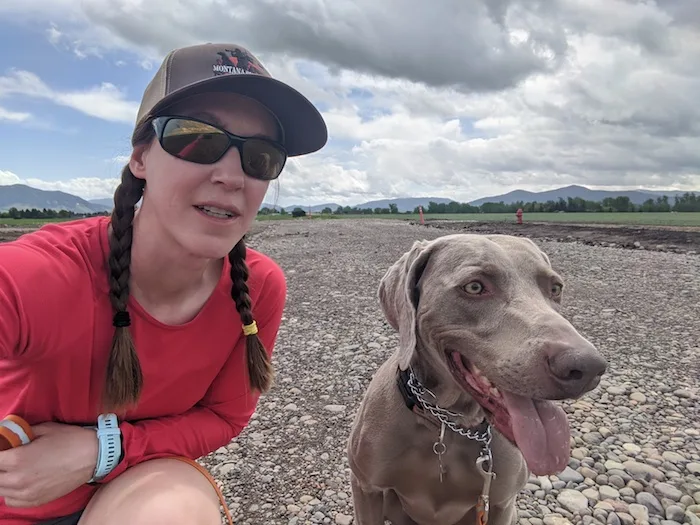
While I’m from Minnesota and have plenty of hunters in my family, I’ve never actually gone hunting.
And, at 4 years old, Remy is by far the oldest beginning dog in the group while also the least experienced and probably the worst behaved. He’s very excitable. I have trouble controlling him. He does not heel when he’s wound up, and he does not come when called reliably.
We’re a mess, at times.
This dog is very humbling. He makes me work hard to see results.
Nonetheless, everyone is very welcoming at NAVHDA. They understand Remy and I are beginners with literally no hunting experience.
Is it too late to start training my dog for hunting?
I would say no, it’s never too late to train a hunting dog if they have the drive to do it.
Some dogs just don’t have the “drive” for birds and you can’t force that. But others have some serious instinct for finding birds, chasing, pointing, retrieving or flushing.
If the dog wants to do the work, it’s never too late to train her, in my opinion.
It’s not about age, it’s about exposure, lots and lots of patience and coming up with a plan that works for you and your dog.
Some dogs are more challenging than others.
I waited so long to start training Remy for hunting because I lived in San Diego when I got him as a puppy.
As you can imagine, it’s not convenient to take your dog hunting in Southern California for many reasons. There is a lack of available land for hunting, the state has strict gun laws and it was a long drive to the training locations.
But we live in Montana now.
Hunting is just one more sport I can do with my active, working dog.
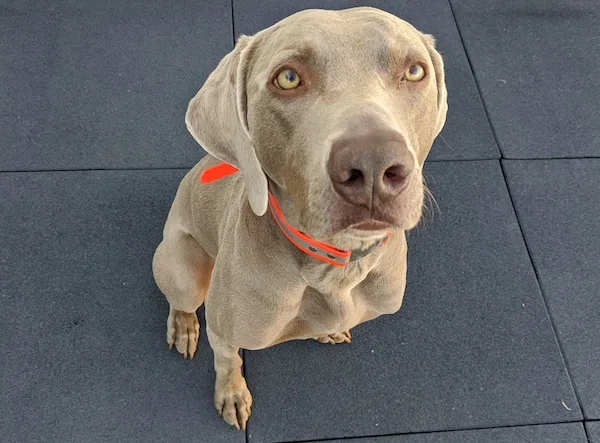
Remy and I train for agility for fun and we train for trail marathons. Hunting is another activity we can do. And it’s what he’s bred to do.
Other resources I’ve found the most helpful
There are also lots of YouTube videos and books that can help you train your bird dog. And there’s always the option of hiring a professional bird dog trainer.
Some of my favorite resources:
Overall benefits of NAVHDA
Here are the benefits I’ve discovered so far:
- Learn about training your hunting dog
- Have fun with your dog & make friends
- Easy access to birds & launchers for training
- Learn about the other versatile hunting dog breeds
- Talk dogs with like-minded people
- Get help from handlers/trainers with different experiences
- Observe the other handlers and dogs and learn
- Get feedback on issues with your dog
What questions or advice do you have for your first NAVHDA training day?
If you plan to attend a NAVHDA event, let me know if you have any questions. I certainly had a bunch before I started.
If you are involved with NAVHDA, please share your experience below for any new people who might be wondering.
I’m sure I’ll have an update sometime soon with how our progress is going!
-Lindsay & Remy

Lee
Wednesday 19th of October 2022
Lindsay I found your article very helpful and thank you for sharing your experience. I’m thinking of getting an upland dog and your article have me very valuable insight. Thanks.
Nancy Stordahl
Tuesday 7th of July 2020
It's great you're so willing to try new activities that you and Remy can enjoy together. He's one lucky dog! Kind of funny he was one of the older dogs in the group.
Sounds like you've both been learning a lot. Thanks for the informative, interesting read. Now I better understand what the term "versatile hunting dog" means.